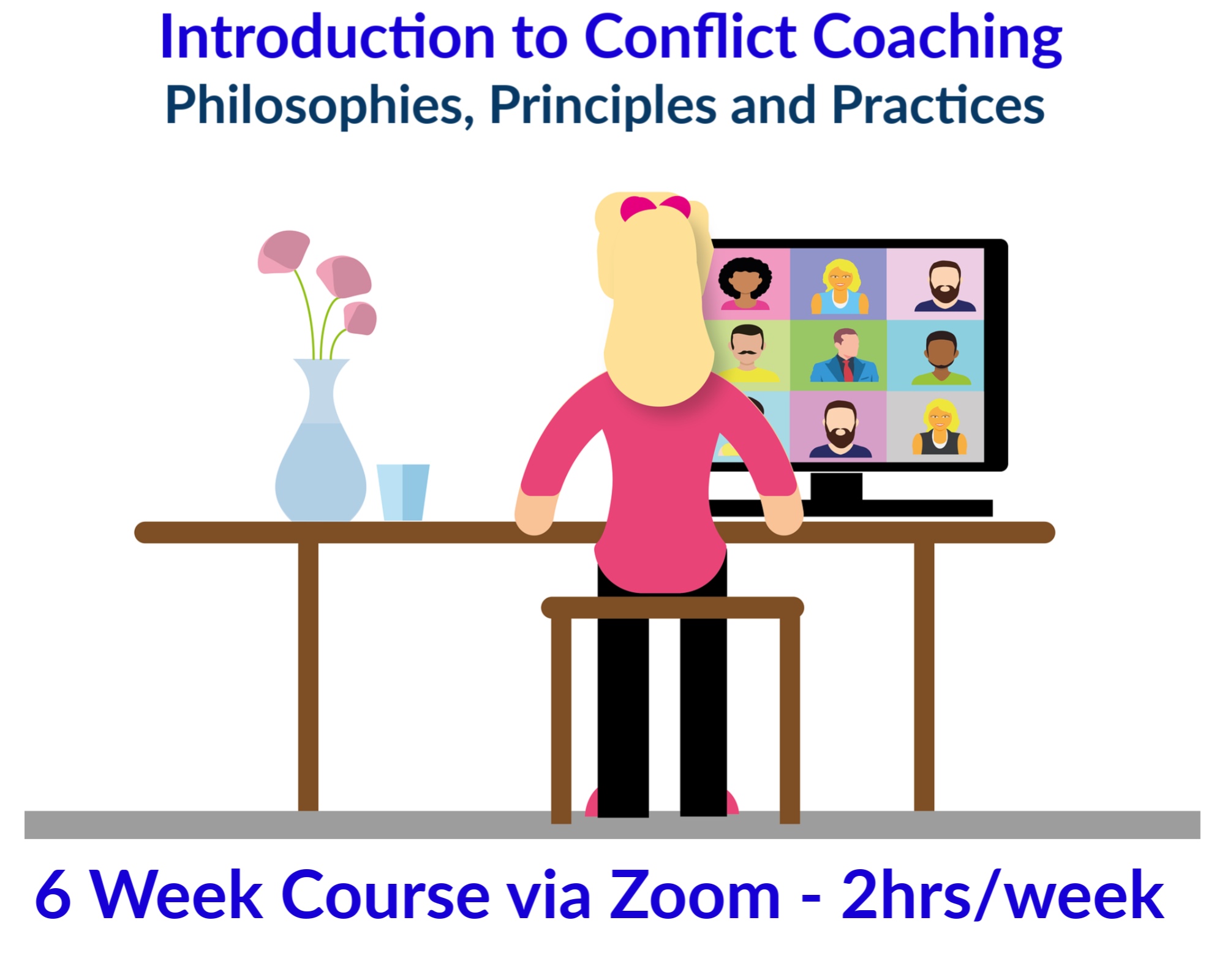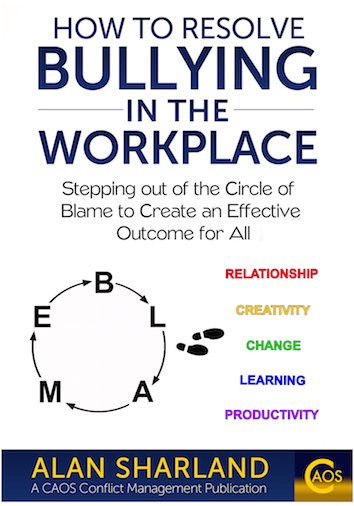Contact CAOS Conflict Management on 020 3371 7507
Workplace Mediation
Greater London Area
 Blame, stress, pressure...unresolved conflict
Blame, stress, pressure...unresolved conflictCAOS provides Workplace Mediation, in and around the London area, to assist in resolving workplace disputes.
(Please note, we do have Associates in other parts of the UK so please contact us if you are not in the London area to see if we can still assist you).
We have particular experience of working with Local Authorities, Universities and Charities but have also worked with businesses.
Workplace Mediation, Conflict Coaching, Training and Mediation Consultancy Support - Some of Our Clients:
- Brunel University
- School of Oriental and African Studies
- London School of Hygiene and Tropical Medicine
- University of East London
- Exeter University
- University of West London
- Norwich University of the Arts
- Bournemouth University
- Plymouth University
- UCAS
Other clients include:
- Bedford Borough Council
- Wyre Forest Nightstop and Mediation
- The Bridge Housing Services, Charnwood, Leics.
- Dell Computers
- Apollo Housing Group
- Hillingdon Association of Voluntary Services
Mediation can help with all of the following situations and more:
- Working relationship breakdown between employees and within teams
- Allegations and counter-allegations of bullying, discrimination, harassment, unfair treatment
- Disputes within organisations at all levels - Chief Executives, Senior Managers, Area Managers, Middle Managers that affect decision making, staff motivation, organisational development
- Change management disputes arising when an organisation is restructuring or adopting a new approach to its activities
- Complaints and disputes involving clients, customers and other stakeholders such as local groups and individuals
- Our workplace mediation support can also help with 'team disputes' involving a disaffected group of employees that have become less productive/creative due to an internal dispute.
We provide a discrete, effective service that can help those involved come to a resolution of their difficulties informally and confidentially, saving time, workplace stress, organisation reputation and cost.
| Contact us on 020 3371 7507 to discuss your difficulty, or make an online enquiry to ask for more information. |
The damaging consequences of workplace disputes can include:
- Reduced staff morale - due to the 'atmosphere' created by such disputes.
- Increased stress for managers and staff due to having an 'additional problem' to deal with, over and above the usual day to day challenges.
- A decrease in productivity arising from these due to reduced staff enthusiasm and reduction in time available to just 'get on with the job'.
- Damage to the organisation's reputation as an employer people want to work for, particularly if gossip and publicity spread awareness of the workplace dispute.
- Avoidance of dealing with usual day to day activities involving the staff in dispute, due to fear of the dispute 'kicking off'...
.......and much more besides. If you are aware of such a dispute, we won't need to tell you the difficulties it can cause.
 Let me finish! No you let ME finish!
Let me finish! No you let ME finish!This is what workplace mediation can help with....
| Click Here for a link to an article on the Guardian newspaper website on 22nd March 2012 about the many benefits and the growing popularity of the use of workplace mediation. (Opens new page) |
The COSTS of workplace disputes can be extremely high if they remain unresolved, and lead to:
- Time taken up by Senior Managers and HR Teams as well as the employees involved, to deal with Grievances, reading reports, assessing evidence etc. and other consequences of the dispute
- Employment Tribunals and associated legal fees
- Recruitment costs if employees leave as a result of the dispute
- Training costs to re-establish a new post-holder
| Some time and money facts and figures associated with workplace disputes from The Chartered Institute of Personnel and Development 2007 survey Managing Conflict at Work: |
- Organisations spend on average 15 days in management time, HR time and in-house employment lawyers’ time preparing for an employment tribunal hearing.
- Taken together, employers spend on average a total of 351 days of HR and management time a year dealing with disciplinary and grievance cases and responding to tribunal claims.
- The average costs associated with employment tribunal claims come to almost £20,000 per organisation per year.
What are the benefits of using Workplace Mediation from CAOS Conflict Management to help in resolving workplace disputes?
- Lower costs
- Improved/ re-established working relationships
- An opportunity to learn from the causes of workplace disputes
- A low-key, confidential, discrete process involving just the mediator and the directly-involved parties to the dispute
The approach we take at CAOS is designed to support the creation of more effective ways of responding to a dispute at all stages of our involvement.
In many approaches to mediation, the initial meeting with each individual involved is used mainly as a preparation for a face-to-face meeting with the other person(s) involved in the situation. (Some approaches do not even have an initial meeting)
This can feel intimidating to those involved in the workplace dispute as, simply by accepting the initial meeting it can feel to the participant as though they are agreeing to meet face-to-face with the other person(s). And hence there can often be a resistance to even taking up mediation.
When you use CAOS Conflict Management for your workplace mediation, our Initial Meeting is designed, in itself, to help any participants who accept it to try to work through other ways of dealing with the difficulty in a different way, that works for them, and is aimed towards improving the situation - whether the participants choose to have a face-to-face mediation meeting or not!
A face-to-face mediation meeting becomes just one of a range of options participants can pursue to try to improve the working relationship they have with the others involved.
This is an approach that differs from some understandings of mediation, but our experience tells us that it is not always essential for a joint meeting to go ahead for the situation to be improved and resolved.
Working 1-to-1 with people involved in unresolved conflict is an expertise we use in our Conflict Coaching which has often led to situations being resolved by those involved and this philosophy applies to our mediation as well.

Time for reflection, learning, resolution and change:
Another approach often used to provide workplace mediation is to try to 'get it all done in a day'.
While this can sound very 'efficient' it may not always be effective, because workplace disputes usually involve a lot of difficult emotion and 'history'.
After an initial meeting, a participant may want some time to reflect on what they want to do, or even to put some of their ideas they have created (if they've had an Initial Meeting with a CAOS Mediator) into practice.
We understand, of course, that time is an important issue, but sometimes, having a few days to reflect can be far more beneficial than having to jump from one 'preparatory' meeting, straight into a face-to-face mediation meeting without a chance to think things through. Mediation is meant to be voluntary, but putting a 'time pressure' on it can mean that one or all of the participants feel that:
a) they are at the face-to-face meeting 'under duress' - which is not at all conducive to an effective outcome.
b) even if they are willing to attend, they have not had a chance to think through the consequences and what they'd like to achieve from the meeting and so don't actually get the most value from it.
We're not promoting 'dragging it out', but we do, simply, offer a little time between an Initial Meeting and any face-to-face mediation meeting, perhaps a week to 10 days, to allow for some reflection time.
Because this is offered, if the participants still want to go ahead quickly, we know they feel clear that that is their decision and so will feel more comfortable in the meeting, and hence, more likely to commit to making it work.
Please CONTACT CAOS if you have an enquiry about our Workplace Mediation or any of our other services.
What are the benefits of the CAOS approach to Workplace Mediation?
1. Having an Initial Meeting that is focused on supporting creative thinking and improved communication about ways forward for the individual participant, allows for the possibility of new approaches that don't then need a face-to-face meeting!
CAOS takes the view that if participants can work things out after some individual support from a Mediator in an Initial Meeting this is actually a more effective outcome than if a facilitated face-to-face mediation meeting is needed with the Mediator present. We consider all people to have the capacity to work things out themselves even if they have not, to date, been able to draw upon that capacity.
But doesn't that mean you charge less, because you haven't done the face-to-face meeting?
Yes, and think what that does for our reputation! We can't promise that it will happen, but it is always our aim to support resolution at all stages of our involvement. If the participants want a face-to-face meeting - great. If they feel they can work things out without one - great.
2.Using an approach to workplace mediation that listens to the participants' wishes with regard to timescales means that there is a greater likelihood of 'buy in' to the aims and intentions of mediation - thus leading to a greater likelihood of resolution.
People often feel unsafe, even threatened, when they are involved in workplace disputes. Ensuring they feel some sense of choice and control over the pace of mediation reduces the fear of being steam-rollered into an 'agreement' they are not happy with.
But can't that be abused - to drag things out and avoid dealing with the situation?
Workplace mediation should never be an obstacle to other procedures continuing. It is most effective when it is offered in parallel with other procedures so that it can be offered at any point in the life of a dispute. When used in that way it cannot hold up other actions that may be occurring. Participants, as adults, will be able to take any timescales relating to other procedures into account when deciding the pace at which they want to go with mediation.
What if one party decides not to participate in mediation, or decides they don't want a face-to-face meeting?
Mediation is a voluntary process, and so this is always possible. This does not mean the situation can't be resolved. Even if just one person involved in a dispute changes their responses to the situation, this can lead to a different, more effective outcome from those that have occurred in the past.
This is why we explore other ways of responding in the Initial Meeting as well as explore what a participant would want to do if the other(s) did not want to have a face-to-face mediation meeting.
CAOS Conflict Management also offers Conflict Coaching for situations where people may not even want to consider mediation in the first place, or where they have, but the others involved in their dispute did not wish to take part.
What's your success rate?
Many mediation services quote a 'success' rate. What this usually represents is the number of mediation cases that reach a written agreement. Unfortunately, as Neville Chamberlain once found, having a piece of paper with an agreement written on it is not what matters.
What matters is what happens after a workplace mediation meeting, irrespective of whether it can be written down on a piece of paper. This is not to say agreements can't be an important and useful outcome of a mediation meeting - just that measuring how many are created is not an effective measure of the 'quality' of mediation provided, nor of the actual level of resolution of the problem. Ultimately, it is not the Mediator who is successful, it is the participants.
Being measured by 'how many agreements are reached' can also lead to mediators prioritising 'getting an agreement', placing the opportunity for parties to connect and learn from the situation as secondary to the mediator getting 'a result'.
Consider this comment from a disgruntled participant in mediation who wrote into Building Magazine:
In many cases, the mediators ........are only intent on three things: achieving the highest rate of prepayment possible for their activities; obtaining an agreement regardless of the justice of it; and protecting themselves and their profession from any legal comebacks. When at last I am free to publish the full story of our sad plight I will be sure to include the wording contained in a typical mediation agreement – it will make very interesting reading.
While this gentleman's experience was in relation to a building dispute, the issues remain the same. We believe that the approach of CAOS Conflict Management would have led to his views about mediation being different.
Outcomes of workplace mediation that may not be recordable in an agreement document include:
- How a staff member (Manager or Employee) feels about returning to work and taking up the working relationship with the other disputant(s) after mediation.
- Whether a staff member feels they have been listened to and will not return to a similar feeling of isolation or being treated disrespectfully in the future.
CAOS Conflict Management is committed to providing workplace mediation that ensures these aspects of a workplace dispute, that relate to how people feel and are affected by the dispute, are given a chance to be explored as they are intrinsic to the true resolution of any difficulty.
Please also remember that if you have a situation where just one colleague is interested in trying a process to resolve a workplace dispute, we also offer Conflict Coaching, which provides 1-to-1 support for individuals experiencing unresolved conflict. Click Here for more information about this popular service from CAOS Conflict Management.
Return from Workplace Mediation to CAOS Conflict Management Home Page
Join our Online course:
An Introduction to the Philosophies, Principles and Practice of the CAOS Model of Conflict Coaching - Click this link to find out more
Mediation from CAOS Conflict Management
CAOS Conflict Management provides mediation in all types of dispute situations but links to some of the main areas are given below:

University Mediation including student complaints and accommodation disputes.
Please click the image above or the text below to purchase this book written by Alan Sharland, Director of CAOS Conflict Management:

Equality and Diversity Mediation





